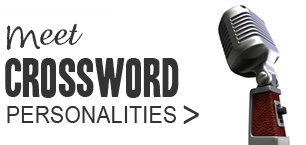 Which abbreviations should you be aware of when solving cryptic crosswords? If you’re setting, which abbreviations are fair to use in your clues? Is there an authoritative list of all possible abbreviations? These questions come up often in the minds of cryptic crossword folks, and we have today guest author Dean Mayer (Anax/Loroso), cryptic crossword setter for the top daily crosswords in UK - The Independent, the FT and The Times – giving you the answers. |

Let us start by establishing which dictionaries are regarded as standard sources. They are the big three; in no particular order, Chambers, Collins and the Shorter Oxford English Dictionary (SOED). If you are lucky enough to own all three, a casual riffle through their pages should quickly reveal that they are surprisingly varied in terms of which words they include.
Historically, Chambers has always promoted itself as the dictionary for wordgames, and while this is true for things like Scrabble it doesn’t have quite the influence on crosswords as you might expect.
The Times favours Collins, both for its single-letter abbreviations and for headword entries. For the latter, grid entries which aren’t in Collins are usually permitted if they appear in both Chambers and SOED (occasionally just one of those if it’s felt the answer should be familiar to most solvers).
The Independent and FT seem quite similar to each other in that they accept abbreviations which are in everyday use, regardless of whether or not a particular dictionary lists them. For example, they will accept W, D and L as won/drawn/lost because you’ll see these abbreviations use on any results table in a newspaper’s sports pages.
The Telegraph relies almost entirely on Chambers for its abbreviations (hence W, D and L aren’t allowed) but places almost no restrictions when it comes to obscurity – as long as it’s there in Chambers it’s usually OK for use.
The Sunday Times is quite generous, allowing most dictionary sources, but the puzzle itself is designed to be a fairly gentle solve so it’s more likely an abbreviation will be rejected if it is deemed too obscure, or if its contribution to a clue renders it too difficult.
Unfortunately, because I don’t set for the Guardian I can’t really comment on their policy, but from those puzzles I’ve solved it appears there’s a mix of the more familiar elements of Collins and Chambers.
One of the reasons setters can get confused is… well, speaking for myself, laziness. A cluttered desk can be an uncomfortable working environment, so instead of having dictionaries spread out before me I have Crossword Compiler for construction and Crosswordman for the abbreviation lists it provides through its Wordplay Wizard feature. The only problem is that its abbreviations are listed as ‘Any’, ‘UK’ and ‘UK Advanced’, so it’s often a case of thinking ‘Well, I’d be amazed if that’s not in Chambers/Collins/SOED’ – and sometimes it’s just a case of taking a punt and hoping the abbreviation is acceptable.
So why do newspapers prefer different dictionaries? Isn’t it restrictive to setters and potentially confusing to solvers?
There isn’t a right or wrong about it, and a newspaper doesn’t choose a particular dictionary in an effort to be awkward. It is simply the expression of a crossword series ‘flavour’ and the choice(s) of dictionary are almost as important as the imposition of Ximenean or Libertarian clueing. Given a bit of practice, you can identify where a crossword has come from just by looking at which abbreviations it uses.
It may well be restrictive to setters, but look at this way; if you start work for an employer you don’t tell him/her what the terms of your contract will be. They tell you, and it’s your responsibility to stick to the rules.
And it shouldn’t be confusing to solvers – eventually, anyway. You gradually become used to what certain newspapers allow, and become less likely to get stuck all because of one letter.
Related Posts:
- What I learnt in my first stint as crossword setter
- So the slips might not show ~ Chaturvasi
- Useful tools for crossword setters ~ Anax
If you wish to keep track of further articles on Crossword Unclued, you can subscribe to it in a reader via RSS Feed. You can also subscribe by email and have articles delivered to your inbox, or follow me on twitter to get notified of new links.








 Follow on Twitter
Follow on Twitter Join us on Facebook
Join us on Facebook Get RSS
Get RSS

3 comments
I suspect The Times favours the Collins because the publishers of the paper and the dictionary are both owned by Rupert Murdoch & Co.
Topically witty perhaps, but not true. The Chambers 'wordgame' reputation means that many of its headwords are far too obscure for daily puzzles, so if the crossword series relies on it there's risk of arguments between setter/editor about which words are valid for use.
Besides, there's never an indication in the newspaper about what dictionary/ies the puzzle series uses, so there's no commercial benefit or bias towards any dictionary publisher.
The Sunday Times cryptic might indeed have been a "gentle solve" once upon a time, but now there is someone called Dean who can produce a right twister of a crossword, on occasion...
:-)
Post a Comment